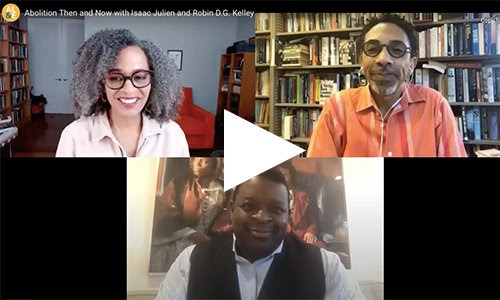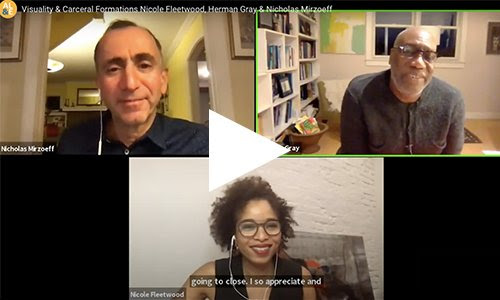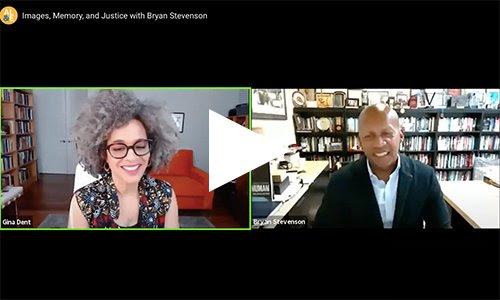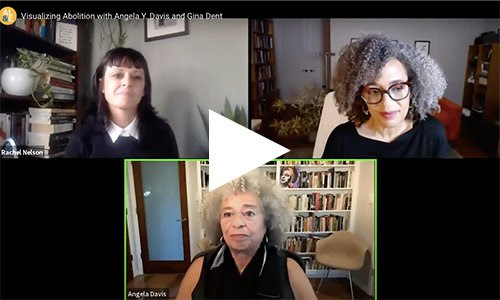Immigration policies in the United States: Understanding violence nation-wide and in Santa Cruz
Deportation is far more than a policy term; it is a threat and an act with explosive impact on families and communities. UC Santa Cruz Professor of Psychology, Regina Day Langhout, lead author on a policy brief, “Statement on the Effects of Deportation and Forced Separation on Immigrants, their Families, and Communities,” will discuss the far-reaching impacts of deportation and collective resistance.
Bill McKibben & Vandana Shiva in Conversation – Social Transformation: Visions & Mobilizations
For decades, Vandana Shiva and Bill McKibben have used their moral imaginations to envision a better world, articulate a global agenda for sustainable societies, advocate for policy advancements, and support social movements. Join Shiva and McKibben to imagine the future from the perspective of people and the planet, including a look at what Green New Deal & Just Recovery programs could help seed around the world in terms of livelihoods, human rights, and the environment.
Bill McKibben & Vandana Shiva in Conversation – Social Transformation: Visions & Mobilizations
For decades, Vandana Shiva and Bill McKibben have used their moral imaginations to envision a better world, articulate a global agenda for sustainable societies, advocate for policy advancements, and support social movements. Join Shiva and McKibben to imagine the future from the perspective of people and the planet, including a look at what Green New Deal & Just Recovery programs could help seed around the world in terms of livelihoods, human rights, and the environment.
Abolition Then and Now with Isaac Julien and Robin D.G. Kelley
Abolition Then & Now features Robin Kelley and Isaac Julien in conversation about the anti-slavery movements of the eighteenth & nineteenth centuries & current abolitionist uprisings against racist police brutality & the prison industrial complex. This event coincides with the presentation of Julien’s Lessons of the Hour, 2019, a ten-screen film installation that explores the legacy of Frederick Douglass & his vision for abolition in relationship to contemporaneity, at McEvoy Foundation for the Arts.
Visuality & Carceral Formations Nicole Fleetwood, Herman Gray & Nicholas Mirzoeff
The third event in the Visualizing Abolition series brings together visual and cultural theorists Nicole Fleetwood, Herman Gray and Nicholas Mirzoeff to consider the roles of visual culture in normalizing mass incarceration and the racist brutalities of policing within the social landscape and political vision of America. Questions of visuality and formations moves beyond critiques of film, television, advertisements, and other media to ask how dominant visions of the world—and the visual regimes that regulate what people see and what remains hidden from view—are materialized in the prison industrial complex.
Visuality & Carceral Formations Nicole Fleetwood, Herman Gray & Nicholas Mirzoeff
The third event in the Visualizing Abolition series brings together visual and cultural theorists Nicole Fleetwood, Herman Gray and Nicholas Mirzoeff to consider the roles of visual culture in normalizing mass incarceration and the racist brutalities of policing within the social landscape and political vision of America. Questions of visuality and formations moves beyond critiques of film, television, advertisements, and other media to ask how dominant visions of the world—and the visual regimes that regulate what people see and what remains hidden from view—are materialized in the prison industrial complex.
Images, Memory, and Justice with Bryan Stevenson
Founder/executive director of the Equal Justice Initiative (EJI) Bryan Stevenson is the featured speaker for the second event in Visualizing Abolition, joining Gina Dent for a conversation about art, culture, and activism.
Bryan Stevenson is a widely acclaimed public interest lawyer who has, over the last two decades, tirelessly worked to challenge the racial and economic injustices of mass incarceration in the United States. Stevenson has also been at the forefront of the creation of two cultural sites, The Legacy Museum and The National Memorial for Peace and Justice. For Visualizing Abolition, Stevenson will discuss how those institutions relate to his legal social justice initiatives.
Visualizing Abolition with Angela Y. Davis and Gina Dent
Angela Y. Davis and Gina Dent, noted antiprison activists, scholars, and educators, for an online conversation about critical issues in the arts, visual culture, and abolition. This is the first in a series of events that questions what it means to think of abolitionism as a vision—one that challenges the social, economic, and political worldviews that prisons promote.
All-In All-Together
Community based research navigating the turbulent time and places of political and biological pandemics. We launch our series with an initial set of ‘cases’ meant to help us understand how community-university collaborations are evolving, what community partners need from universities in these times/spaces, what role research can play in the current struggles, what barriers partnerships are facing and what successes have they discovered.
Session 1 – October 23, 2020 Presenters: Youth Voices: Univ. of Utah Neighborhood Partner Initiative, Survivors Justice Project Research Collective, We Belong: UCSC & Community Action Board Partnership, Honors Living Learning Community.
Visualizing Abolition with Angela Y. Davis and Gina Dent
Angela Y. Davis and Gina Dent, noted antiprison activists, scholars, and educators, for an online conversation about critical issues in the arts, visual culture, and abolition. This is the first in a series of events that questions what it means to think of abolitionism as a vision—one that challenges the social, economic, and political worldviews that prisons promote.
All-In All-Together
Community based research navigating the turbulent time and places of political and biological pandemics. We launch our series with an initial set of ‘cases’ meant to help us understand how community-university collaborations are evolving, what community partners need from universities in these times/spaces, what role research can play in the current struggles, what barriers partnerships are facing and what successes have they discovered.
Session 1 – October 23, 2020 Presenters: Youth Voices: Univ. of Utah Neighborhood Partner Initiative, Survivors Justice Project Research Collective, We Belong: UCSC & Community Action Board Partnership, Honors Living Learning Community.
UCSC PIT-UN Speaker Series with Brandie Nonnecke, Founding Director of the CITRIS Policy Lab
The CITRIS Policy Lab: Supporting Interdisciplinary Research to Inform Evidence-Based Policymaking. Join us to learn about the CITRIS Policy Lab’s recent research, how it draws upon this research to support policymakers’ decisions in the public and private sectors, and strategies to help you translate your research into policy deliverables that can inform the ethical development and deployment of technology.
How to use Twitter for Social Impact
How to Use Twitter for Social Impact workshop on September 22, 2020. This workshop for UC Santa Cruz faculty and graduate students explores Twitter as a tool for social impact. The presenters share tips and guidance about how to reach influencers and policy makers, how to communicate research via Twitter, and how to gain followers.
California: Our Criminal Justice System and Political Possibilities
Session 4 of “Elections: What They Are Good For. Democracy, Dilemmas & Decisions” with Anjuli Verma, Craig Haney, and Erin Haney.
How to use Twitter for Social Impact
How to Use Twitter for Social Impact workshop on September 22, 2020. This workshop for UC Santa Cruz faculty and graduate students explores Twitter as a tool for social impact. The presenters share tips and guidance about how to reach influencers and policy makers, how to communicate research via Twitter, and how to gain followers.
California: Our Criminal Justice System and Political Possibilities
Session 4 of “Elections: What They Are Good For. Democracy, Dilemmas & Decisions” with Anjuli Verma, Craig Haney, and Erin Haney.
California: Changing Demographics, Youth, and Integrated Voter Engagement
Session 3 of “Elections: What They Are Good For. Democracy, Dilemmas & Decisions” with Veronica Terriquez, Randy Villegas, Mindy Romero, Martin Higuera, and Ines Garcia.
Elections, the Constitution, and Institutional Reform
Session 2 of “Elections: What are they Good for? Democracy, Dilemmas & Decisions” with Daniel Wirls, UC Santa Cruz Professor of Politics and Kathay Feng, National Redistricting Director of Common Cause.
Hope, Fear, and Desire for Democracy on the Eve of an Election
Session 1 of “Elections: What Are They Good For? Democracy, Dilemmas & Decisions” with Dean Mathiowetz, Associate Professor of Politics, Deborah Gould, Associate Professor of Sociology, and Cristina Beltrán (Porter ’92), Associate Professor at New York University.
Elections, the Constitution, and Institutional Reform
Session 2 of “Elections: What are they Good for? Democracy, Dilemmas & Decisions” with Daniel Wirls, UC Santa Cruz Professor of Politics and Kathay Feng, National Redistricting Director of Common Cause.
Hope, Fear, and Desire for Democracy on the Eve of an Election
Session 1 of “Elections: What Are They Good For? Democracy, Dilemmas & Decisions” with Dean Mathiowetz, Associate Professor of Politics, Deborah Gould, Associate Professor of Sociology, and Cristina Beltrán (Porter ’92), Associate Professor at New York University.
Online Groceries: eCommerce, the pandemic & the future of work in retail food
What are the implications of this trend for the people doing the work of fulfilling online orders and delivering food? Based on a 3-year study of technological change and future of work in the grocery industry, this talk will address these changes. Since many of the new positions are gig jobs through on-demand platforms like Instacart and DoorDash, this talk will also discuss the implications of the high profile political battle being waged in California over employee status of gig workers.
University Forum: The Early-Stage Impacts of COVID-19 on Small Business Owners in the United States
The early impacts on small business and entrepreneurs resulting from the onset of COVID-19 and the disparate governmental responses to it are not well known. Stores, factories and many other businesses have closed by policy mandate, downward demand shifts, health concerns, or other factors. To better understand where we are, it is necessary to assess how large the early-stage impacts of COVID-19 are on small business owners. What are the disproportionate effects on female, minority and immigrant business owners? These are some of the issues that Economics Professor Rob Fairlie will address in this timely talk.
University Forum: The lessons of COVID for global and community health
Globally and nationally, COVID is teaching us a great deal about the huge inequalities in vulnerability, resilience, and blame, as well as instructive divergences in health system capacity, governmental response, and socio-economic disruption. Featuring Matt Sparke, professor of politics and member of the team at UCSC developing the new global and community health program at UC Santa Cruz, and Nancy Chen, professor of anthropology and former director of the UCSC Blum Center on poverty, social enterprise, and participatory governance.
University Forum: The Early-Stage Impacts of COVID-19 on Small Business Owners in the United States
The early impacts on small business and entrepreneurs resulting from the onset of COVID-19 and the disparate governmental responses to it are not well known. Stores, factories and many other businesses have closed by policy mandate, downward demand shifts, health concerns, or other factors. To better understand where we are, it is necessary to assess how large the early-stage impacts of COVID-19 are on small business owners. What are the disproportionate effects on female, minority and immigrant business owners? These are some of the issues that Economics Professor Rob Fairlie will address in this timely talk.
University Forum: The lessons of COVID for global and community health
Globally and nationally, COVID is teaching us a great deal about the huge inequalities in vulnerability, resilience, and blame, as well as instructive divergences in health system capacity, governmental response, and socio-economic disruption. Featuring Matt Sparke, professor of politics and member of the team at UCSC developing the new global and community health program at UC Santa Cruz, and Nancy Chen, professor of anthropology and former director of the UCSC Blum Center on poverty, social enterprise, and participatory governance.
COVID-19 Lightning Talk: Agro-food Tech
With funding from the National Science Foundation, professor Julie Guthman delves into how food and agriculture is becoming a popular site of innovation and investment in the midst of the pandemic. Guthman discusses the various technologies that are accelerating in the agro-food tech sector with caution as these modes of production disproportionately expose people of color to the coronavirus.
COVID-19 Lightning Talk: Government Responses in Latin America
Sara Niedzwiecki, assistant professor of politics, centers her research in Argentina, Brazil, and Mexico. Many workers in these countries are employed in the informal sector, restricting access to unemployment benefits. Niedzwiecki compares and contrasts the governmental responses to the pandemic of these three countries while examining the impact of policies that have been measured on the respective countries’ inhabitants.
COVID-19 Lightning Talk: Impacts in Rural Africa
David Park, a graduate student, highlights his joint research findings on the economic impacts of COVID-19 in Liberia and Malawi. Park’s research seeks to explore the effects of and response to the pandemic in rural areas of both East and West Africa.
COVID-19 Lightning Talk: Government Responses in Latin America
Sara Niedzwiecki, assistant professor of politics, centers her research in Argentina, Brazil, and Mexico. Many workers in these countries are employed in the informal sector, restricting access to unemployment benefits. Niedzwiecki compares and contrasts the governmental responses to the pandemic of these three countries while examining the impact of policies that have been measured on the respective countries’ inhabitants.
COVID-19 Lightning Talk: Impacts in Rural Africa
David Park, a graduate student, highlights his joint research findings on the economic impacts of COVID-19 in Liberia and Malawi. Park’s research seeks to explore the effects of and response to the pandemic in rural areas of both East and West Africa.
COVID-19 Lightning Talk: Cognitive Development
Professor Su-hua Wang, co-founder of New Gen Learning, addresses the inequality in educational experiences of underserved students. Professor Wang’s research seeks to uplift strategies for effective learning. These practices and strategies include teaching culturally relevant material, collaborative learning efforts and community resilience.
University Forum: Solidarity Economics for the Coronavirus Crisis & Beyond with Prof. Chris Benner
In the long term—not just in the current emergency—mutuality matters, morally and economically. An ethos of mutual caring and support leads to better health outcomes and helps to generate a more prosperous and resilient economy and society. Professor Benner discusses how we urgently need to think long term—both about the things that got us into the crisis, and how we can refashion our economy and society as we eventually emerge.
Inequality & Vulnerability in Crisis
Glorene Das / Tenaganita, Colin Gonsalves, Manfred Nowak / Global Campus for Human Rights, and Emoke Bebiak explore how, like most crises, COVID-19 takes extraordinarily high demands on those already exposed in society. How can we turn this crisis into an opportunity to strengthen human rights and more just societies?
COVID-19 and Unemployment
Robert Fairlie, professor of economics, discusses his collaborative research project on the economic impact of COVID-19 on unemployment rates amongst African American and Latinx communities. Fairlie’s research findings show that the unemployment rate amongst these two groups is around 30%, an unprecedented number.
University Forum: Solidarity Economics for the Coronavirus Crisis & Beyond with Prof. Chris Benner
In the long term—not just in the current emergency—mutuality matters, morally and economically. An ethos of mutual caring and support leads to better health outcomes and helps to generate a more prosperous and resilient economy and society. Professor Benner discusses how we urgently need to think long term—both about the things that got us into the crisis, and how we can refashion our economy and society as we eventually emerge.
Inequality & Vulnerability in Crisis
Glorene Das / Tenaganita, Colin Gonsalves, Manfred Nowak / Global Campus for Human Rights, and Emoke Bebiak explore how, like most crises, COVID-19 takes extraordinarily high demands on those already exposed in society. How can we turn this crisis into an opportunity to strengthen human rights and more just societies?
COVID-19 and Unemployment
Robert Fairlie, professor of economics, discusses his collaborative research project on the economic impact of COVID-19 on unemployment rates amongst African American and Latinx communities. Fairlie’s research findings show that the unemployment rate amongst these two groups is around 30%, an unprecedented number.
COVID-19 and the Class of 2020
Lecturer Steve Owen is researching how COVID-19 has impacted the graduating class of 2020. This research project seeks to understand the economic effects of the pandemic and how COVID-19 has impacted perceptions of the future for the graduating class of 2020.
COVID-19 and Student Research
Rebecca London highlights UCSC student research in sociology and the coronavirus. Students will have the chance to be featured in a journal published by the American Sociological Association.
Health Care Access, Service Delivery, and Youth Civic Engagement in the Central Valley during the COVID-19 Pandemic
USC Program for Environmental and Regional Equity (PERE) and UC Santa Cruz Associate Professor Veronica Terriquez present a webinar on the disparate impacts of the global pandemic on Central Valley communities.
Threats & Opportunities for Democracy
Frances Moore-Lappé, Jamila Raqib, Vesna Teršelič, and Elizabeth Beaumont discuss COVID-19’s far-reaching effects not only on public health but also on our capacities for democratic politics.
COVID-19 and Student Research
Rebecca London highlights UCSC student research in sociology and the coronavirus. Students will have the chance to be featured in a journal published by the American Sociological Association.
Health Care Access, Service Delivery, and Youth Civic Engagement in the Central Valley during the COVID-19 Pandemic
USC Program for Environmental and Regional Equity (PERE) and UC Santa Cruz Associate Professor Veronica Terriquez present a webinar on the disparate impacts of the global pandemic on Central Valley communities.
Threats & Opportunities for Democracy
Frances Moore-Lappé, Jamila Raqib, Vesna Teršelič, and Elizabeth Beaumont discuss COVID-19’s far-reaching effects not only on public health but also on our capacities for democratic politics.
Water Justice in the Age of Coronavirus and Beyond
Maude Barlow, Robert Bilott, and Andy Szasz explore how pre-existing conditions, polluted waters, and lack of access might make the pandemic worse.
COVID-19 and Gig Workers
Dr. Chris Benner, Director the Institute for Social Transformation, discusses how COVID-19 has impacted gig workers. Dr. Benner created two surveys to determine the impacts of the pandemic on and the findings highlight how gig workers are particularly vulnerable during these times.
Women in Global Health – COVID Spotlight
Monika Hauser, Sima Samar, Eva Zillén, and Nancy Chen discuss how women are disproportionately affected the current pandemic.
COVID-19 and Gig Workers
Dr. Chris Benner, Director the Institute for Social Transformation, discusses how COVID-19 has impacted gig workers. Dr. Benner created two surveys to determine the impacts of the pandemic on and the findings highlight how gig workers are particularly vulnerable during these times.
Women in Global Health – COVID Spotlight
Monika Hauser, Sima Samar, Eva Zillén, and Nancy Chen discuss how women are disproportionately affected the current pandemic.
Building Solidarity Economics in the Age of Coronavirus and Beyond
Nnimmo Bassey, Vandana Shiva, and Chris Benner explore how alternative economic frameworks are informing and informed by this moment of the coronavirus crisis.
12 Steps to Reboot the California Economy
As California faces off against the federal government on everything from immigration to climate change, the state has the opportunity to do something radically different: transform our infrastructure, education, workforce development, housing, and transportation systems for the 21st century.





